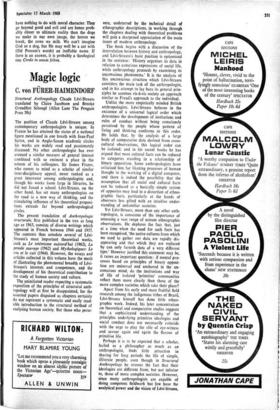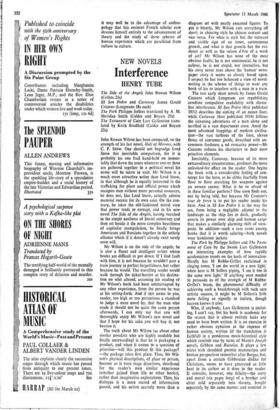Magic logic
C. von FURER-HAIMENDORF
Structural Anthropology Claude Levi-Strauss translated by Claire Jacobson and Brooke Grundfest Schoepf (Allen Lane The Penguin Press 50s) The position of Claude Levi-Strauss among contemporary anthropologists is unique. In France he has attained the status of a national figure mentioned in one breath with Jean-Paul Sartre, and in Anglo-Saxon academic circles his works are widely read and passionately discussed. No other anthropologist has ever aroused a similar measure of general interest combined with so eminent a place in the esteem of his colleagues. Sir James Frazer, who comes to mind as a scholar of similar inter-disciplinary appeal, never ranked as a great innovator among anthropologists and, though his works loom large in libraries, he did not found a school. Levi-Strauss, on the other hand, has set many anthropologists on the road to a new way of thinking, and the stimulating influence of his theoretical proposi- tions extends far beyond anthropological circles.
The present translation of Anthropologie structurale, first published in the USA as long ago as 1963, consists of diverse writings which appeared in French between 1944 and 1957. The contents thus antedate several of Levi- Strauss's most important theoretical works, such as Le totemisme aujourd'hui (1962), La pens& sauvage (1962) and Mythologiques: Le cru et le cuit (1964). However, the essays and articles collected in this volume have the merit of illustrating the phenomenal breadth of Levi- Strauss's interests and competence, and the development of his theoretical contribution to the study of human society and culture.
The uninitiated reader expecting a systematic exposition of the principles of structural anth- ropology will at first be disappointed, for the assorted papers disguised as chapters certainly do not represent a systematic and easily read- able introduction to the structural method of analysing human society. But those who perse- vere, undeterred by the technical detail of ethnographic descriptions, in working through the chapters dealing with theoretical problems will gain a sharpened appreciation of the main issues of modern anthropology.
The book begins with a discussion of the interrelation between history and anthropology, and Levi-Strauss's basic position is epitomised in the sentence: 'History organises its data in relation to conscious expressions of social life, while anthropology proceeds by examining its unconscious phenomena.' It is the analysis of this unconscious structure which Levi-Strauss considers the main task of the anthropologist, and in his attempt to lay bare its general prin- ciples he assumes vis-à-vis society an approach similar to Freud's approach to the individual.
Unlike the more empirically minded British anthropologists, Levi-Strauss believes in the existence of a universal logical order which determines the development of institutions and rules of conduct without being consciously perceived by the people whose pattern of living and thinking conforms to this order. He holds that, by the analysis of a large body of comparative data derived from cross- cultural observations, this logical order can be isolated; and in his recent books he has argued that most cultural facts can be reduced to categories standing in a relationship of binary opposition. Some anthropologists have criticised him for likening processes of human thought to the working of a digital computer, and there is indeed the possibility that the assumption that all social and cultural facts can be reduced to a basically simple system of opposites may lead to a distortion of ethno- graphic facts, particularly at the hands of observers less gifted with an intuitive under- standing of unfamiliar societies.
Yet Levi-Strauss, more than any other anth- ropologist, is conscious of the importance of amassing a vast range of minute ethnographic observations. He deplores the fact that, just at a time when the need for such facts has been recognised, 'the native cultures from which we used to gather our data are rapidly dis- appearing and that which they are replaced by can only furnish data of a very different type.' However justified this statement may be, it raises an important question: if mental pro- cesses based on principles of binary opposi- tion are universal and anchored in the un- conscious mind, do the institutions and way of life of isolated 'primitive' communities reflect them more clearly than those of the more complex societies which take their place?
Apart from his early and most fruitful field research among the indigenous tribes of Brazil, Levi-Strauss himself has done little ethno- graphic work. Indeed, his later concentration on theoretical and comparative studies suggests that a sophisticated understanding of the principles underlying primitive ideologies and social conduct does not necessarily coincide with the urge to play the role of eye-witness and savour again and again the flavour of primitive life.
Perhaps it is to be expected that a scholar, hailed as a philosopher as much as an anthropologist, finds little attraction in sharing for long periods the life of simple, illiterate people, even though in Structural Anthropology he stresses the fact that their ideologies are different from, but not inferior to, those of more complex societies. However, since many anthropologists are capable of doing competent fieldwork but few have the analytical power and the vision of Levi-Strauss,
it may well be to the advantage of anthro- pology that this eminent French scholar now devotes himself entirely to the advancement of theory and the study of those spheres of human experience which are paralleled from culture to culture.











































 Previous page
Previous page